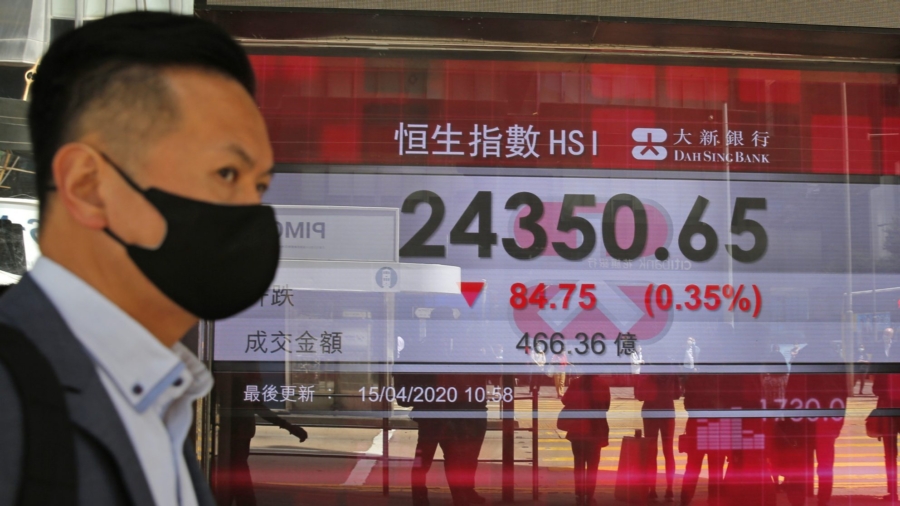Global stocks and oil prices tumbled on April 15 after the International Monetary Fund (IMF) said the world’s economy will suffer its worst year since the Great Depression of the 1930s due to the CCP virus pandemic.
Indexes in London and Frankfurt were down about 2 percent and benchmarks in Shanghai, Tokyo, Hong Kong, and Sydney closed lower. Wall Street futures were down by over 1.5 percent.
The price of oil hit a new 18-year low after the International Energy Agency said demand will drop by 9.3 million barrels per day in 2020 overall. Demand in April will hit its lowest since 1995, it said.
The drop came despite an agreement over the weekend among OPEC and other oil producers to cut output to reflect collapsing demand.
Benchmark U.S. crude lost 40 cents to $19.71 per barrel. Brent crude, the international standard, declined $1.02 to $28.58 per barrel in London.

The IMF said this year’s global economic output will shrink by 3 percent, a bigger loss than 2009’s 0.1 percent decline during the financial crisis. That was a sharp reverse from the Fund’s January forecast of 3.3 percent growth before the CCP (Chinese Communist Party) virus prompted governments to shut down factories, travel, and other industries.
“The IMF forecast a deep economic winter,” said Hayaki Narita of Mizuho Bank in a report. Narita said.
The IMF’s chief economist, Gita Gopinath, said the loss to global gross domestic product, the broadest gauge of economic output, could amount to $9 trillion, or more than the economies of Germany and Japan combined.
In Europe, London’s FTSE 100 lost 2.3 percent to 5,661 and the DAX in Frankfurt declined 2.1 percent to 10,473. The CAC 40 in France retreated 1.9 percent to 4,437.
On Wall Street, the future for both the benchmark S&P 500 and the Dow industrials sank 1.6 percent.
On Tuesday, the S&P climbed 3.1 percent. The index surged 12 percent last week but is about 16 percent below its February all-time high.

In Asia, the Shanghai Composite Index lost 0.6 percent to 2,811.17 and the Nikkei 225 in Tokyo declined 0.5 percent to 19,550.09. Hong Kong’s Hang Seng was off 1.2 percent at 24,145.34.
The S&P-ASX 200 in Sydney lost 0.4 percent to 5,466.70 while India’s Sensex added 0.9 percent to 30,982.37. New Zealand advanced 2.5 percent while Jakarta lost 1.7 percent and Singapore retreated 1.3 percent.
Investors are focusing on how and when authorities may begin to ease business shutdowns and limits on people’s movements imposed to slow the spread of the CCP virus.
U.S. President Donald Trump has been discussing how to roll back federal social distancing recommendations. U.S. governors are collaborating on plans to reopen their economies in what is likely to be a gradual process to prevent the CCP virus from rebounding.

The discussions follow signs the outbreak may be leveling off in some of the hardest-hit areas, including New York City.
In Italy, Spain, and other places around Europe where infections and deaths have begun stabilizing, the process of reopening economies is already underway. Some businesses and industries are being allowed to reopen in a calibrated effort to balance public health and their countries’ economic well-being.
The IMF expects economic contractions this year of 5.9 percent in the United States, 7.5 percent in the 19 European countries that share the euro currency, 5.2 percent in Japan and 6.5 percent in the United Kingdom. The Fund said China, where the pandemic originated, should eke out 1.2 percent growth this year, better than some private sector forecasters who expect little to no growth in the world’s second-biggest economy.

China has reopened factories, shops, and other businesses after declaring victory over the outbreak but forecasters say it will take months for industries to return to normal output, while exporters will face depressed global demand.
Wall Street expects profits will fall for most companies in the S&P 500. The focus is on what management teams have to say about what profits look like for the rest of the year.
Analysts are forecasting a drop of roughly 10 percent in earnings per share for S&P 500 companies for the first quarter and 21 percent for the second quarter.
In currency markets, the dollar advanced to 107.39 yen from Tuesday’s 107.17 yen. The euro retreated to $1.0912 from $1.0981.
By Joe McDonald
Epoch Times staff contributed to this report.


